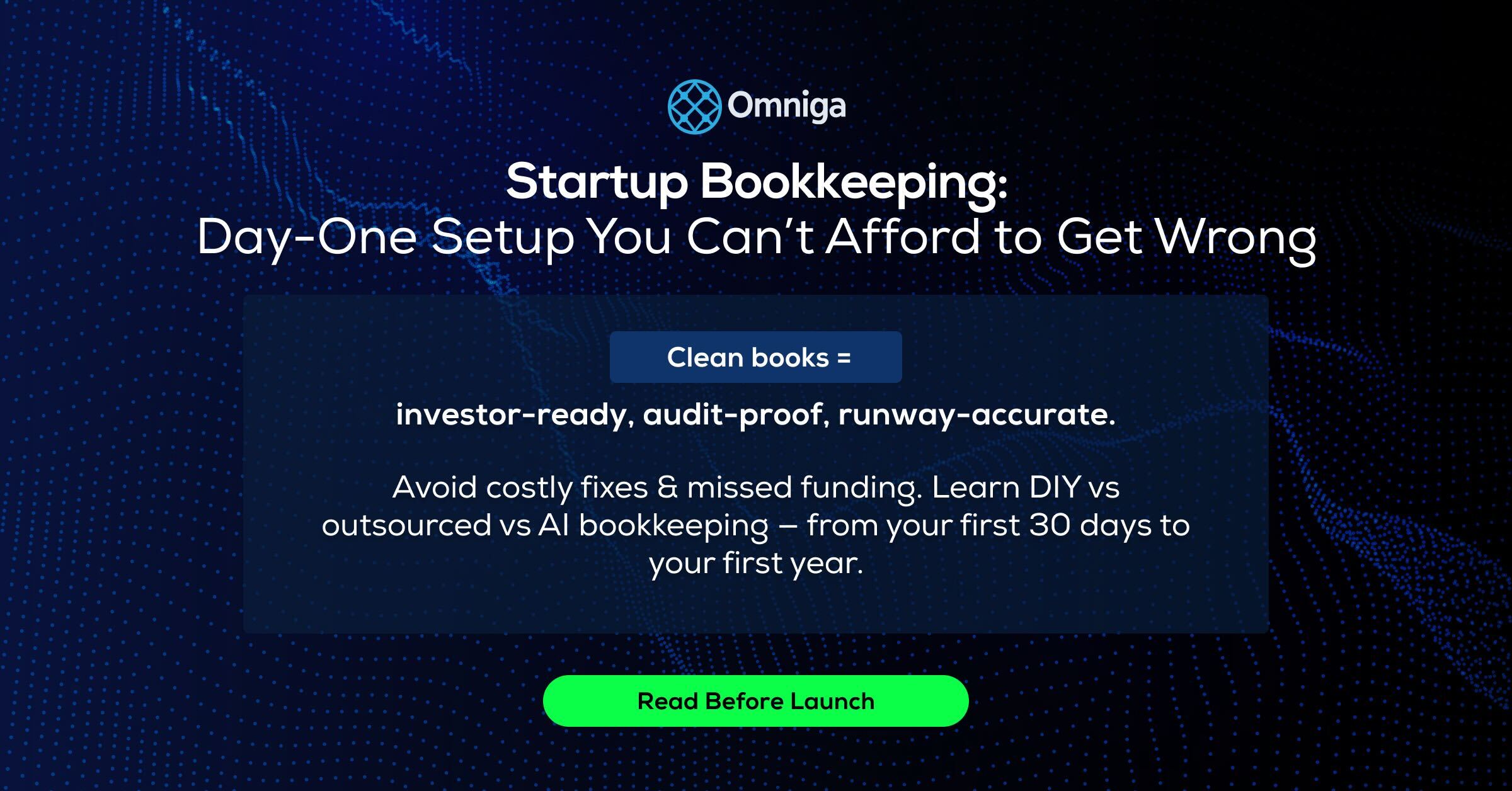Bookkeeping for Startups: Complete Day One Setup Guide (2025)

Master startup bookkeeping from day one with our complete guide. Compare DIY vs outsourced vs AI bookkeeping solutions for investor-ready books.
Table of Contents
Introduction
Launching a startup is an exercise in juggling priorities. Product, hiring, fundraising, customer acquisition—all demand your attention. But one area you can't afford to neglect from day one is bookkeeping for startups.
Clean books aren't just a compliance requirement. They're the foundation of investor readiness, tax savings, and understanding your company's burn rate and runway. Get it wrong, and you risk missed opportunities, messy diligence, or expensive cleanups later. Get it right, and your numbers become a strategic advantage. The accuracy of your financial records is crucial for building trust with investors and stakeholders, ensuring your company is positioned for growth and confidence.
If you're exploring outsourced options, our full guide to virtual bookkeeping services explains the costs, benefits, and best providers for startups.
Related guides
- Monthly bookkeeping packages — Understand what's included in monthly bookkeeping packages, SLAs, and service limits
- Virtual bookkeeping services vs software — Compare outsourced bookkeeping services with DIY software solutions
- Outsourced virtual bookkeeping services — Complete guide to outsourced bookkeeping costs, benefits, and providers for startups
- Part-time bookkeeper vs outsourced team — Decide between hiring a part-time bookkeeper or working with an outsourced team
- Bookkeeping services pricing — Learn what to expect for bookkeeping service costs and package options
Bookkeeping is the Foundation
Bookkeeping is the backbone of any business's financial management, providing a clear and accurate picture of your company's financial health. For startups and small businesses, maintaining up-to-date financial records isn't just about staying organized—it's essential for tax compliance, strategic planning, and long-term growth. Effective bookkeeping means systematically recording, classifying, and reporting every financial transaction, ensuring your business meets all regulatory requirements and is always ready for tax season.
Our team specializes in delivering expert professional bookkeeping support tailored to the unique needs of startups and small businesses. From ongoing bookkeeping and tax preparation to detailed financial reporting, our team helps you save time and reduce manual data entry, so you can focus on what matters most: growing your business. Dedicated teams provide personalized support for startup bookkeeping, ensuring that your financial management is aligned with your business goals.
By outsourcing your bookkeeping to our professionals, you gain access to monthly financial statements, expense tracking, and cash flow management—giving you real-time insights to make smarter decisions and drive your business forward. Professional support by experts allows small business owners more time for growing their business instead of monitoring finances.
Why Startups Can't Afford Messy Books
Investor readiness → Every due diligence process—whether it's a seed SAFE note or Series A—starts with financial statements. Investors want confidence that your numbers are accurate and repeatable.
Burn rate + runway tracking → Without disciplined bookkeeping for startups, you're flying blind on how much cash you're actually spending each month—and how long you have left.
Tax compliance → The IRS doesn't accept "we were busy building" as an excuse. Even early on, penalties for missed filings or incorrect reporting can be painful. According to the IRS Publication 583, startups must maintain proper business records from day one to support tax filings and determine correct tax liability.
Industry leaders like Bench, Pilot, and Kruze Consulting all stress the same point: investor-ready books matter early, not just once you've "made it."
The Startup Bookkeeping Playbook
Think of bookkeeping as a staged journey that evolves as your business grows. Flexible professional bookkeeping support evolves with the needs of growing startups, adapting to the increasing complexity of financial management. Each stage is designed to help startups better manage their financial records and processes, ensuring efficient handling of finances as the business develops.
The First 30 Days → DIY with structure
- Open a dedicated business bank account
- Start separating personal and business expenses
- Set an initial budget to help monitor spending and ensure financial discipline in the early days
- Use a simple spreadsheet or QuickBooks Online for transactions
The First 90 Days → Choose software + categorize expenses
- Pick a system: QuickBooks, Xero, or an AI bookkeeping software option.
- Set categories early (marketing, software, payroll)
- Establish a monthly cadence to review cash in/cash out
- Prepare your records and documentation for future financial reviews and reporting
- Understand monthly bookkeeping package limits to choose the right service tier as you grow
- Explore best QuickBooks integrations to extend functionality as your needs expand
The First Year → Decide on part-time vs outsourced
At 50–100 transactions/month, bookkeeping becomes too complex for DIY. Decide whether to bring in a part-time bookkeeper, move to outsourced bookkeeping, or lean on virtual bookkeeping services. Evaluate which bookkeeping option is the right fit for your startup's current stage and complexity.
Options for Startup Bookkeeping
DIY bookkeeping → when it works, when it fails
Works when: < 50 transactions/month, simple expenses, founder or co-founder discipline, often managed directly by the founder or co-founder in the earliest stages.
Fails when: investors ask for GAAP-ready reports, multiple employees, or revenue recognition complexity.
Hiring a part time bookkeeper
Cost-effective in early stages, but comes with risks: inconsistent processes, turnover, lack of SaaS expertise. Engaging professional accountants can provide additional expertise and oversight, ensuring more reliable financial management than a part-time bookkeeper.
Outsourced bookkeeping vs in-house teams
Professional bookkeeping firms provide structure and expertise but may charge $500–$2,000/month. These firms have supported numerous startups through various growth stages, building trust and reliability with their clients. In-house teams only make sense post-Series B or $10M+ ARR.
Virtual bookkeeping services
Cloud-based providers that combine software + human bookkeepers. Ideal for startups that want flexibility without a full hire. Many virtual providers also offer integrated tax services for startups, making it easier to manage both bookkeeping and tax needs in one place.
Efficient Bookkeeping Systems
TL;DR: Modern accounting solutions combine AI technology with professional expertise to automate data entry, reduce errors, and provide real-time financial insights—allowing startups to scale without hiring full-time staff.
Implementing efficient bookkeeping systems is crucial for businesses looking to streamline their financial management and control costs. Key benefits include:
• Automated data processing - Eliminates manual entry and reduces human error
• Real-time financial visibility - Track cash flow, expenses, and revenue instantly
• Expert oversight - Professional review ensures accuracy and compliance
• Scalable solutions - Systems grow with your business needs
• Cost optimization - Reduce overhead while improving financial management quality
We offer a comprehensive suite of online bookkeeping services, including accounts payable, accounts receivable, payroll, and financial reporting—all tailored to fit your business's specific needs. Our expert team ensures every transaction is properly recorded and reported, giving you a transparent view of your company's financial health.
With our accounting solution, your business benefits from streamlined processes, expert support, and the confidence that your books are always in order.
How AI & Automation Change the Game
Modern automated bookkeeping tools reduce founder workload dramatically:
- Automated expense categorization → AI learns from past entries
- Real-time reconciliation → Syncs with bank and card feeds daily. For QuickBooks users, QuickBooks reconciliation services ensure your month-end reconciliation workflow keeps bank and credit card accounts accurate as transaction volume grows.
- Error detection → Flags anomalies faster than a human review
Instead of hiring sooner, founders can push off costs by adopting automated bookkeeping workflows. This approach combines automation with fractional oversight, giving you both speed and confidence—similar to what fractional CFO services provide for strategic finance.
Real-Time Financial Insights
Access to real-time financial insights is a game-changer for businesses aiming to make smarter decisions and accelerate growth. Our online bookkeeping services provide instant access to your financial data, allowing you to track cash flow, monitor expenses, and analyze revenue as it happens. This level of visibility empowers you to respond quickly to changes, seize new opportunities, and maintain control over your finances.
Our dedicated team works closely with you to deliver tailored financial reporting and in-depth analysis, helping you identify areas for improvement and optimize your financial performance. From financial statements and budgeting to forecasting and analytics, our bookkeeping services are designed to give you the insights you need for success.
By combining our expertise with cutting-edge technology, your business gains a deeper understanding of its financial health—enabling data-driven decisions that support ongoing growth and long-term success.
Bookkeeping for SaaS Startups
If you're building SaaS, the bar is higher for bookkeeping for SaaS companies. Different industries, including SaaS, have unique bookkeeping and financial reporting needs. Investors expect not just clean books but clean metrics:
- Revenue recognition & deferred revenue → You can't book a year-long contract upfront
- Monthly Recurring Revenue (MRR) → Must tie back to actual customer payments
- Churn, CAC:LTV, gross margin → Numbers depend on accurate transaction categorization
This is where SaaS-focused providers like Kruze stand out—and where AI bookkeeping software helps reduce human error while maintaining the precision these metrics require.
Choosing the Right Path
Here's a simple framework to evaluate options:
| Model | Best For | Costs | Risks | Scalability |
|---|---|---|---|---|
| DIY | Pre-seed, < 50 txns/mo | Free–$30/mo | High error risk | Not scalable |
| Part-time bookkeeper | Small teams, < $1M ARR | $200–$500/mo | Limited expertise | Moderate |
| Outsourced bookkeeping | Funded startups, growth stage | $500–$2,000/mo | Costly early | High |
| AI bookkeeping software | Lean startups, SaaS, tech-savvy founders | $69–$300/mo | Newer tech | High |
For a deeper dive into choosing between part-time bookkeeper vs outsourced team, see our comprehensive guide that compares costs, accuracy, and when to upgrade.
Decision tree:
- Pre-seed → DIY + software
- Seed with employees → AI + part-time
- Post-raise / complexity → Outsourced or hybrid
Many providers have helped numerous clients across different stages and industries, demonstrating their commitment to supporting small business growth and providing reliable professional bookkeeping support.
Startup Bookkeeping Checklist (Day One)
✅ Open a business account
✅ Choose bookkeeping software (QBO, Xero, or Omniga)
✅ Separate personal + business expenses
✅ Set a recurring reminder for monthly reviews
✅ Regularly review your money management practices to ensure financial health
✅ Track burn and runway in a simple chart
✅ Save receipts and invoices digitally
✅ Build investor-ready reporting early
Final Take
Startup founders don't need CFO-level systems on day one—but they do need structured, scalable bookkeeping for startups from the start. As a co-founder, it's crucial to establish good financial habits early. Don't overlook taxes—incorporating tax prep into your financial routine ensures you're ready for tax season and helps avoid costly mistakes, as outlined in SBA's financial management guidance.
Whether you go DIY, hire a part-time bookkeeper, outsource, or lean into AI bookkeeping software, the key is discipline and clarity. The right choice depends on your stage, complexity, and growth trajectory—but starting with proper systems from day one is non-negotiable.
If you want to stay focused on building while ensuring your books are investor-ready, consider exploring how AI and automation are transforming fractional services and modern finance operations. The future of accounting talent and tools shows how automation is reshaping finance roles and enabling leaner teams.
